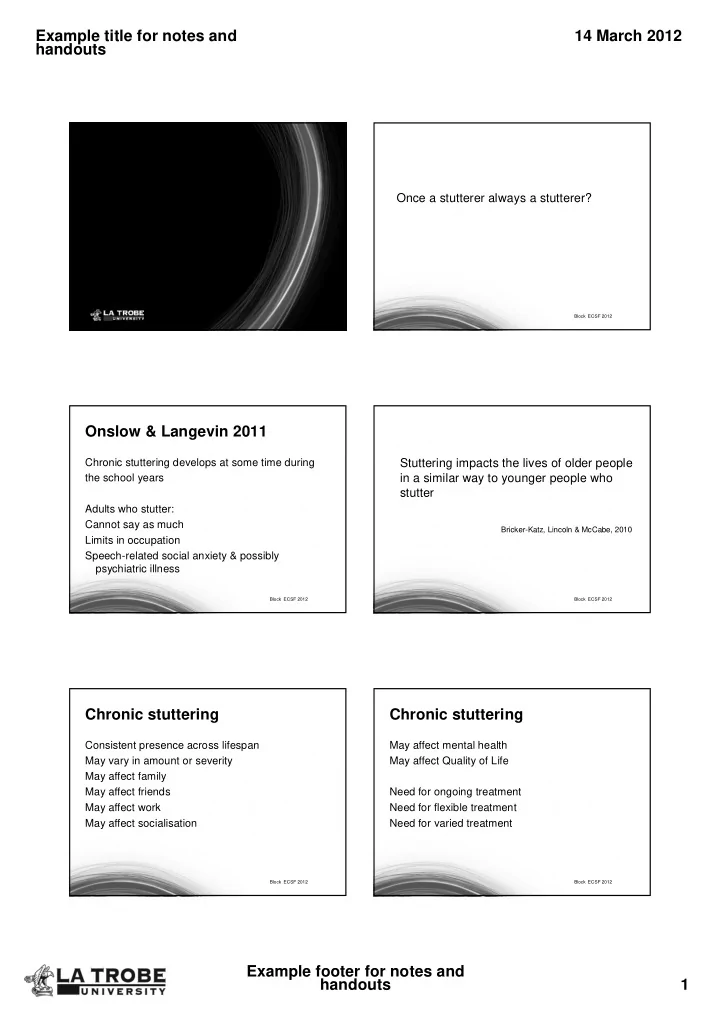

Example title for notes and 14 March 2012 handouts Treatment of chronic stuttering: Benefits and Once a stutterer always a stutterer? challenges Susan Block La Trobe University, Melbourne, Australia Block ECSF 2012 Onslow & Langevin 2011 Chronic stuttering develops at some time during Stuttering impacts the lives of older people in a similar way to younger people who the school years stutter Adults who stutter: Cannot say as much Bricker-Katz, Lincoln & McCabe, 2010 Limits in occupation Speech-related social anxiety & possibly psychiatric illness Block ECSF 2012 Block ECSF 2012 Chronic stuttering Chronic stuttering Consistent presence across lifespan May affect mental health May vary in amount or severity May affect Quality of Life May affect family May affect friends Need for ongoing treatment May affect work Need for flexible treatment May affect socialisation Need for varied treatment Block ECSF 2012 Block ECSF 2012 Example footer for notes and handouts 1
Example title for notes and 14 March 2012 handouts Considerations in treatment Speech issues – motor control Speech issues – motor control Fluency strategies Evidence: Prolonged/Smooth speech Psychological issues Intensive Camperdown Program/telehealth Naturalness Ease of use Sufficient treatment Block ECSF 2012 Block ECSF 2012 Psychological issues Other impact Anticipation Concerns re employment thinking stuttering vs process Concerns re socialisation Anxiety Concerns re children Other mental health issues General participation: ICF UTBAS Evidence: CBT Block ECSF 2012 Block ECSF 2012 Essentials Essentials Appropriate treatment: Goals? Self management Sufficient treatment Self evaluation Varied treatment Attitude to communication Extending treatment - flexibility Locus of control Enhancing maintenance Communication/Social skills Managing relapse Dual tasking Block ECSF 2012 Block ECSF 2012 Example footer for notes and handouts 2
Example title for notes and 14 March 2012 handouts Challenges …”one of the things that bothered me most after 2/12 or so • Treatment experience of fluent speech after intensive therapy was that I was • Continue to feel different fluent, but there was so much more to conversation than • Need to dual task the social interaction skills I knew of.” • Treatment does not eliminate stuttering: fluency Cream et al, 2003 has a price Block ECSF 2012 Block ECSF 2012 Challenges Maximum benefits when: • Student delivered treatment Strategic approach to • Poorly educated clinicians • Stuttered speech • Self help groups • Communication strategies • Lack of access to treatment Cream et al, 2003 Block ECSF 2012 Block ECSF 2012 Clinicans: Important factors Benefits Knowledge and experience Adults who stutter Clinical experience Increased fluency Passion about stuttering Knowledge about speech On board for the entire journey Increased well-being Mentors Increased participation Marriage research, treatment and student Positive about treatment education Block ECSF 2012 Block ECSF 2012 Example footer for notes and handouts 3
Example title for notes and 14 March 2012 handouts Benefits Speech Pathologists/clinicians Older adults would like effective, individual, and short-term treatment with Working with motivated adults speech–language pathologists who are Empowering adults knowledgeable about stuttering and Using wide range of clinical repertoire sensitive to their emotional needs. Flexibility Evidence based effective treatment Bricker-Katz, Lincoln & McCabe, 2010 Block ECSF 2012 Block ECSF 2012 Block ECSF 2012 Example footer for notes and handouts 4
Recommend
More recommend